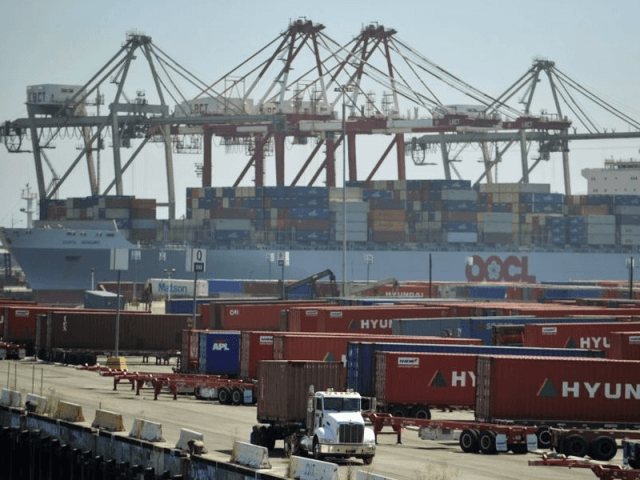For the last four months, the International Longshoreman and Warehouse Union has been involved in a “work slow-down” to shake-down employers for higher wages. But with 29 West Coast ports handling 43.5% of U.S. containerized cargo shipments and the movement of 12.5% of America’s GDP, a looming strike could cost billions of dollars per day and severely hurt the U.S. economy.
The West Coast ports serve as the entry and exit for trade between the U.S. and Asia. Talks between the Pacific Maritime Association (PMA), representing port management, and the International Longshore and Warehouse Union (ILWU) officially broke down on Wednesday. Local sources indicate that the union will walk out within the week.
ILWU workers’ compensation package is believed to already be the most lucrative of any blue-collar in America. Full-time workers working 2,000 hours per year earn an average of $142,000 annually in wages and a benefits package that costs over $82,000 a worker. “Clerks” that work an average of 50 hours per week earn over $200,000. But “walking bosses,” the equivalent of warehouse foremen, can earn over $300,000.
The payroll for just 13,600 ILWU workers that man the West Coast ports was a stunning $1.4 billion in 2013.
With no signed union/management contract in place since July 1, 2014, the union told crews to “work safe.” The code words slowed container traffic by 50% in Seattle and Tacoma, a walk out by mid-shift in Oakland, and a sudden shortage of crane operators in Los Angeles and Long Beach. The ILWU dockworkers claim they just want a new six-year contract.
The 13,600 ILWU members employed by the Pacific Maritime Association have been working at ports along the West Coast without a contract since June 30, 2014. At the heart of the dispute is “work to rule,” a labor tactic in which dock workers are encouraged to legalistically follow every written company production rule to the extreme. Instead of working as teams, ILWU members operate individually with the rule book in their hands.
The result is cargo that used to take two days to leave the port has been taking about seven days. The National Retail Federation, the National Association of Manufacturers and the Chamber of Commerce claim that West Coast dockworkers seriously undermined the holiday shopping season.
The ILWU spokesmen say that the business groups are exaggerating the potential pain to the American economy and the huge pileups on shipping docks are due exclusively to management incompetence.
The real issue that has caused the labor friction is that the International Brotherhood of Electrical Workers and the International Association of Machinists unions are both trying to compete, and have won some contracts with individual PMA employers. The ILWU had been unwilling to strike since employers have plenty of alternative workers at substantially lower wages.
The National Retail Federation recently sent a letter to President Obama warning that a coastal strike or shutdown “may be imminent.” The merchants group estimates such action could cost the U.S. economy $2 billion a day.
The Retail Industry Leaders Association added that the “work slowdown during contract negotiations over the past seven months has already created logistic nightmares for American exporters, manufacturers and retailers dependent on an efficient supply chain. A complete shutdown would be catastrophic, with hundreds of thousands of jobs at risk if America’s supply chain grinds to a halt.”
In a similar series of ILWU “safe job action” work slowdowns in 2002, the Pacific Maritime Association closed down their operations and locked out workers for 10 days. With the shutdown costing the U.S. economy close to $1 billion a day, President George W. Bush invoked the Taft-Hartley Act to reopen the ports.
Although shippers, ports and members of Congress have bombarded the White House with letters pleading for the President to send in a federal mediator to help resolve contract talks between the union/management negotiations, the Obama White House has been mostly silent about the port controversy. The Administration’s only statement came last month, when a spokesman said the President was confident both sides could reach a deal “through the time-tested process of collective bargaining.”

COMMENTS
Please let us know if you're having issues with commenting.